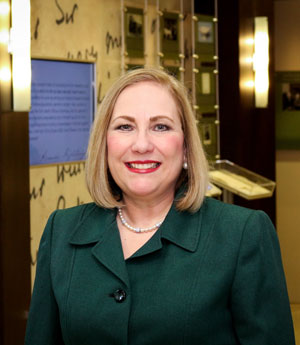 Maria Shirey, PhD, MBA, MS, RN, NEA-BC, ANEF, FACHE, FAANBy Jennifer Lollar
Maria Shirey, PhD, MBA, MS, RN, NEA-BC, ANEF, FACHE, FAANBy Jennifer Lollar
The University of Alabama at Birmingham School of Nursing has received a four-year, $2.8 million grant to help improve health outcomes in medically underserved areas in Alabama and to educate undergraduate nursing students and practicing RNs in team-focused primary care.
The project, “Building a Resilient Primary Care Registered Nurse Workforce for Chronic Disease Prevention and Control in Alabama,” is funded by a Nurse Education, Practice, Quality and Retention (NEPQR) grant from the U.S. Department of Health and Human Services Health Resources and Services Administration (HRSA) and will focus on training and sustaining baccalaureate-prepared RNs in medically underserved areas.
The project’s principal investigator, Chair of the Department of Acute, Chronic and Continuing Care and Professor Maria Shirey, PhD, MBA, MS, RN, NEA-BC, ANEF, FNAP, FACHE, FAAN, said the role of the BSN-prepared RN is integral to care coordination and management of patient transitions from hospital to home. However, over the past several decades RNs have disappeared from most community-based primary care settings, often replaced by less trained medical assistants. When RNs are found in primary care settings, they often are limited to triaging phone calls and walk-ins, not practicing to the full extent of their education and training.
“Alabama and the U.S. have a primary care service deficit, especially in medically underserved areas, and BSN-prepared RNs are capable of assuming greater responsibility for care management for patients with chronic conditions across all levels of prevention, as well as follow-up and complex specialty care coordination for those discharged from the hospital,” she said. “BSN-prepared RNs can provide safe, high-quality care to at-risk populations such as patients with multiple chronic conditions, while also managing the costs of such care.”
The project also builds on the UAB School of Nursing’s expertise in interprofessional collaborative practice and education for community-based chronic disease management of individuals with complex medical conditions.
It will create a nurse-led primary care hub with six community partners throughout Alabama, expanding existing and creating new academic-practice partnerships in medically underserved areas in Jefferson, Etowah and Macon counties through the UAB School of Nursing nurse-managed PATH Clinic for diabetes, HRTSA Clinic for heart failure and Bessemer Neighborhood Health Clinic, as well as the Jefferson County Department of Health, Macon County Department of Health and East Central Alabama Area Health Education Center.
The sites will serve as clinical training locations for BSN students focusing on primary care nursing with an emphasis on chronic disease prevention and control in diabetes, high blood pressure, mental health and substance abuse. In Macon County, the School is joining forces with the Tuskegee University School of Nursing and Allied Health as an affiliate partner.
“We wanted Tuskegee as an affiliate partner due to our longstanding informal relationship and synergy across our respective visions and missions,” Shirey said. “This affiliate partnership also provides a unique opportunity to address health disparities in the Black Belt area of the state by educating nurses who plan to stay in their communities. In educating undergraduate nursing students and practicing RNs in team-focused primary care, together UAB and Tuskegee will contribute toward the national call for RNs to work as partners in transforming primary care.”
Tuskegee faculty will participate, and 12 Tuskegee BSN students will be among the 60 students expected to graduate as RN Primary Care Scholars across the four-year project.
 Constance Smith Hendricks, PhD, RN, FAANTuskegee University School of Nursing and Allied Health Dean Constance Smith Hendricks, PhD, RN, FAAN, said Tuskegee has a rich history of nursing education as the state’s first baccalaureate nursing program and its graduates are dedicated to the health of Alabamians through their significant contributions to nursing and health care. The affiliate partnership with the UAB School of Nursing strengthens both schools’ collective ability to contribute toward the national call for RNs to work as partners in transforming primary care. Smith Hendricks is a former faculty member and Distinguished Alumna of the UAB School of Nursing, earning a bachelor’s degree from the school in 1974 and a master’s degree in 1981.
Constance Smith Hendricks, PhD, RN, FAANTuskegee University School of Nursing and Allied Health Dean Constance Smith Hendricks, PhD, RN, FAAN, said Tuskegee has a rich history of nursing education as the state’s first baccalaureate nursing program and its graduates are dedicated to the health of Alabamians through their significant contributions to nursing and health care. The affiliate partnership with the UAB School of Nursing strengthens both schools’ collective ability to contribute toward the national call for RNs to work as partners in transforming primary care. Smith Hendricks is a former faculty member and Distinguished Alumna of the UAB School of Nursing, earning a bachelor’s degree from the school in 1974 and a master’s degree in 1981.
"Tuskegee University Nursing is honored to have the opportunity to be a partner in this very needed initiative,” Smith Hendricks said. “Our graduates will be the beneficiaries of this unique opportunity to become RNPC Scholars and gain additional skills and knowledge to better serve those in our Black Belt communities with chronic health care needs alongside the UABSON student RNPC scholars.”
Part of the project also will focus on building a resilient workforce by providing the primary care RN workforce with skills to cope with the challenges of caregiving and the unique needs of vulnerable populations. Our goal is to keep RNs healthy and engaged over the course of a career and to do this requires special preparation for the long term.
“To better prepare nurses for the future, we will provide coaching in resilience and training for RNPC Scholars, RN clinical mentors and RNPC faculty,” Shirey said. “We also are developing an annual primary care conference that will begin in 2019 for continuing professional development and to create a supportive network of primary care RNs across the state of Alabama. We are tapping into our technology expertise and partnering within our School with the UAB Nursing Network to launch the first-of-its-kind live, online primary care broadcasts to promote and educate nurses about the RNPC role.”
The program is open to senior undergraduate BSN or RN-to-BSN students with a cumulative GPA of 3.0 or greater and a faculty recommendation. Known as RNPC Scholars, the students will complete a newly developed course of both classroom and clinical experiential learning in primary care nursing, providing them with at least 150 hours of training. Both primary care and community health nursing competencies will be integrated, enabling students to participate in the full spectrum of community-based prevention interventions at the primary, secondary and tertiary levels. We will begin taking students for the RNPC Scholars program in 2019.
Alabama and the U.S. are in the midst of a primary care service shortage, which is growing exponentially, Shirey said. The UAB School of Nursing has educated nurse practitioners for decades to positively impact the number of primary care health care providers; now is the time to contribute toward a national paradigm shift to educate primary care RNs who also can improve access to care.
“Cultivating BSN-prepared nurses in our RNPC Scholars program complements our efforts in building nurse practitioner capacity for primary care; it adds training and development for current undergraduate students to practice to the full scope of their license in community-based primary care teams,” she said. “This RN Primary Care project is a logical next step to expand our School's impact on primary and secondary prevention efforts in medically underserved areas throughout Alabama.”